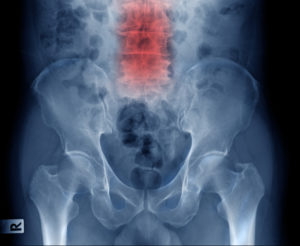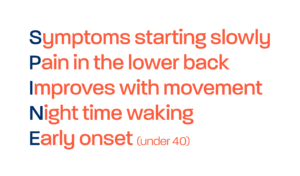Aspiring to Excellence: Quality Improvement in Axial Spondyloarthritis at University Hospital Southampton
A new e-referral service and MRI protocol
Background: Axial spondyloarthritis (axSpA) can be associated with a delay to diagnosis. Anecdotal evidence at UHS suggested that patients were referred via different pathways and that some were not having the correct MRI protocol for diagnosis.
Objectives:
- Reduce time from presentation of AS in primary care to rheumatology referral
- Reduce variation in use of imaging to diagnose axSpA
Methods and results:
Dinny Wallis, Consultant Rheumatologist – University Hospital Southampton describes what the team did:
GP referral system:
“We introduced a new e-referrral pathway for patients with suspected axial spondyloarthritis. This results in patients being booked into a clinic run by a rheumatologist with a special interest in axSpA, ensuring standardisation of secondary care assessment, in particular the use of the correct MRI protocol for diagnosis. The e-referral system has a link to a document which highlights the features of inflammatory back pain and recommended primary care investigations, with the aim of providing educational material for the referrer.”
MRI protocol:
“Although we have always had expert MRI reporting available, there was no standard inflammatory back pain MRI protocol at our hospital and we knew that some patients did not have the right type of scan. Working with a specialist MSK radiologist, we implemented a new whole spine shortened protocol, reducing time for the patient in the scanner, and radiologist reporting time, while maximising the sensitivity of the imaging for axSpA. Using a range of educational interventions (email, presentation, junior doctor induction pack amendments) we demonstrated that the proportion of patients having the correct type of scan increased to over 90%.”




